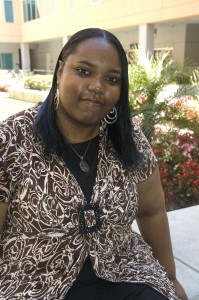Joni Johnson (Class of ’10, B.A., English literature) has received a Graduate Equity Fellowship, a two-year grant awarded by California State University, Dominguez Hills. Johnson, an administrative support assistant in the Child Development Program in the College of Professional Studies, says that her work environment at the university has been a great influence on her performance as a student – and on her career goals as an educator.

“Knowing what offices to go to, who to speak with, forming relationships that help me to do my job efficiently, as well as being surrounded by faculty who are so motivated about teaching students, have all aided in my [own] accomplishments,” she says. “And what they’ve done, they’ve encouraged me to do the same. Dr. Anupama Joshi (professor and chair, Child Development Program and acting director, School of Health and Human Services), Dr. Dee Parker (program coordinator, communication sciences and disorders), and Dr. Kimberley Radmacher (acting program coordinator, Child Development Program) have been a huge, huge support. They’re definitely some of the reasons why I feel like I’ve done well. That kind of support makes a huge difference.”
As an undergraduate, Johnson discovered a love of research that enhanced her aspirations as a writer. Showing great distinction at the university’s Student Research Day this past February, her abstract for “Race in ‘The Great Gatsby: A Post Colonial Perspective” under the guidance of her faculty mentor Lois Feuer, professor of English was the only submission by an English major that was accepted for presentation.
“As an undergrad, I figured you do what is assigned to you and don’t necessarily step out of that box,” says Johnson. “But when I had an opportunity to conduct research and obtain feedback from faculty who have been doing it for a long time, I was thrilled. Dr. Feuer gave me great feedback from the judges because they had never looked at ‘The Great Gatsby’ from that perspective. She encouraged me to continue on so that I could eventually get it published.”
In her non-academic writing, Johnson hopes to ultimately write a novel that explores her interest in personal change and growth.
“I like looking at the world with a sense of how people cope with the day-to-day and what life experience teaches the individual,” she says. “I look at characters who have gone through transitions in their lives, who come back full circle, and who, because of these difficulties, find out if they are better or not.”
Johnson, who is exploring such topics for her master’s thesis as fragmented or dual identity in African American literature from a transnational perspective, says that she always seeks to expose new ideas in her research.
“One of the things I do first is to see if a lot has been written about my idea,” she says. “I want to make sure it’s original and that I’m not saying the same things a lot of other people have said.”
Johnson, who hopes to teach at the community college or university level, says that she looks forward to the challenge of making the traditional canon of American and English literature relevant to a diverse student population by finding “the best way to approach it where it will reach a larger audience. My point is to evoke not necessarily change, but an understanding.”
“My wanting to teach is to transfer information to people, but not necessarily coming from a standpoint where I know it all,” Johnson says. “There are a lot of things that professors know and some things, that when we have discussions in class, they’ve never thought about. I would be open-minded and at the same time because I’m so passionate about it, transfer that passion to students. When students are taught that way, it is contagious and they grab hold of it. I know I did.”
Johnson looks forward to working more as a grad student with her mentors Feuer, Rod Hernandez, associate professor of English, and Thomas Giannotti, professor of English. She also names associate professors Debra Best and Timothy Chin, professor C. Edward Zoerner, adjunct faculty Karen Coley, and department chair Helen Oesterheld, as role models.
“My experience in the English department has been a positive one,” Johnson says. “My professors have made learning so much more interesting, that it was not a burden to do the work. These are qualities I want to emulate when I teach as well.”
For more information on the English Department at CSU Dominguez Hills, click here.